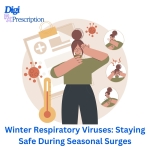
Winter Respiratory Viruses: Staying Safe During Seasonal Surges
As temperatures drop and winter sets in, respiratory viruses such as influenza, RSV (respiratory syncytial virus), HMPV (human metapneumovirus), and even COVID-19 often see a surge. Cold weather and more time spent indoors create the perfect conditions for these viruses to spread, making it essential to take proactive steps to protect yourself and your loved ones. Here’s a guide to understanding and mitigating the risks of winter respiratory viruses.
Why Are Respiratory Viruses More Common in Winter?
Several factors contribute to the seasonal surge of respiratory infections:
-
Cooler Temperatures
Cold air can weaken the mucous membranes in the respiratory tract, reducing their ability to fend off viruses. -
Increased Indoor Gatherings
People spend more time indoors during winter, where ventilation may be poor, making it easier for viruses to spread. -
Lower Humidity
Dry air can allow respiratory droplets to travel farther, increasing the risk of airborne transmission. -
Weakened Immune Systems
Lack of sunlight during shorter winter days can lower vitamin D levels, potentially weakening immune responses.
Common Winter Respiratory Viruses
Some of the most common respiratory illnesses during the winter months include:
- Influenza (Flu): Causes fever, chills, body aches, and fatigue.
- RSV: Common in children and older adults, RSV can lead to bronchiolitis and pneumonia.
- HMPV: Affects individuals of all ages, often causing cold-like symptoms or severe respiratory illness.
- COVID-19: Symptoms range from mild to severe and may overlap with other respiratory viruses.
- Common Cold: Usually mild but can still cause discomfort and spread easily.
Symptoms to Watch For
While symptoms vary depending on the virus, common signs include:
- Cough
- Runny or stuffy nose
- Sore throat
- Fever or chills
- Fatigue
- Difficulty breathing (in severe cases)
If symptoms worsen or persist, seek medical attention immediately, especially for vulnerable individuals like children, older adults, or those with underlying health conditions.
Tips to Stay Safe During Winter Surges
To minimize the risk of contracting or spreading respiratory viruses, follow these practical steps:
1. Get Vaccinated
- Stay up to date on flu shots and COVID-19 vaccines, which are the most effective ways to reduce severe illness and hospitalization.
2. Wash Your Hands Regularly
- Use soap and water to wash your hands for at least 20 seconds.
- Use hand sanitizer with at least 60% alcohol if soap is unavailable.
3. Wear Masks in Crowded Areas
- Consider wearing a mask in crowded or poorly ventilated indoor spaces, especially during peak flu season.
4. Improve Indoor Air Quality
- Use air purifiers and ensure proper ventilation in your home or workspace.
5. Practice Good Respiratory Etiquette
- Cover your mouth and nose with a tissue or your elbow when coughing or sneezing.
- Dispose of used tissues immediately and wash your hands.
6. Stay Home When Sick
- If you experience symptoms, avoid going to work, school, or social gatherings to prevent spreading the virus.
7. Boost Your Immune System
- Eat a balanced diet rich in fruits and vegetables.
- Stay active, get adequate sleep, and consider taking vitamin D supplements if needed.
8. Keep Surfaces Clean
- Disinfect frequently touched surfaces, such as doorknobs, light switches, and phones, to reduce the risk of transmission.
9. Monitor Vulnerable Individuals
- Pay extra attention to young children, elderly family members, or those with chronic health conditions, as they are more susceptible to severe illness.
When to Seek Medical Attention
While most winter respiratory infections resolve on their own, seek medical help if you or someone you care for experiences:
- High fever (especially persistent or recurring)
- Difficulty breathing or shortness of breath
- Severe fatigue or confusion
- Chest pain
- Dehydration or inability to keep fluids down
Conclusion
Winter respiratory viruses are a recurring challenge, but with proactive measures, you can significantly reduce your risk of infection. Staying informed, practicing good hygiene, and making healthy lifestyle choices are key to navigating the season safely. Don’t let the winter surge catch you off guard—take steps today to protect yourself and your family.
